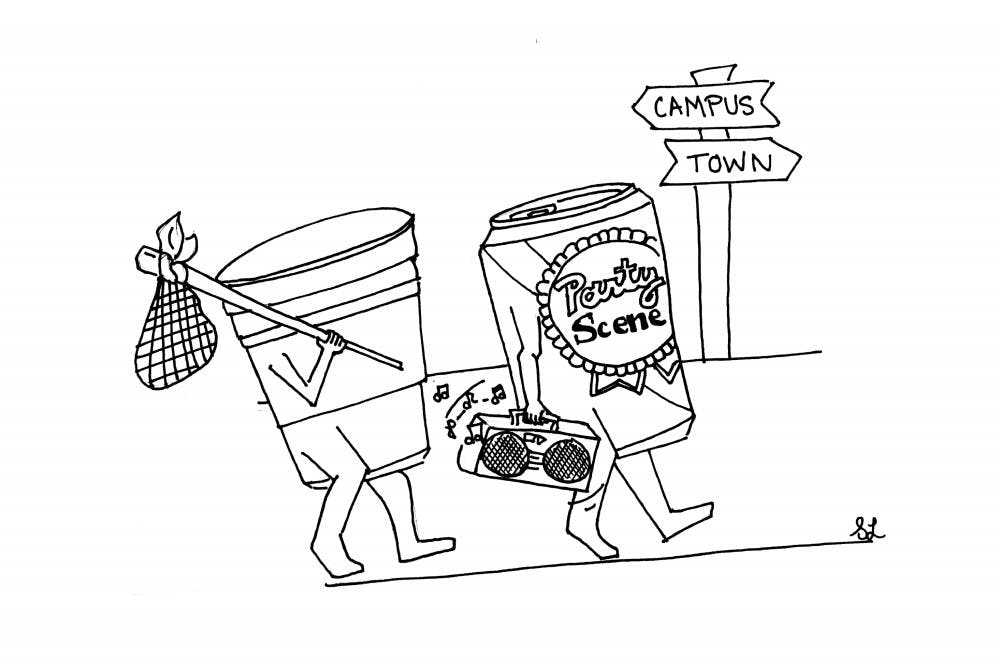Student behavior over Homecoming weekend struck a nerve for many townspeople in Middlebury who were affected by the large and rowdy party on Weybridge St. Angry responses flooded in via Front Porch Forum — an email-based community bulletin — causing Bill Burger, the College’s Vice President for Communications and Marketing, to plan a meeting between local residents and the administration to discuss this relationship.
As we heard in this week’s Campus Voice, some of this behavior is completely appalling. Complaints included anything from lighting fires next to neighbors’ cars to public urination to a general lack of respect for the residents of the town. While many students peacefully coexist with their neighbors, a few notable incidents have come to define the town’s perception of all off-campus residents, and even of all Middlebury students.
The desire to live off-campus is a natural one. After three years of Proctor paninis, linoleum floors, and industrial paper towel dispensers, many seniors want more ownership of their living spaces. The little things like candles and tapestries that are banned in dorms make a room feel more like home. Moreover, living off-campus teaches valuable life skills — how to find an internet provider, how to pay bills, how to navigate the tricky finances of group living when everyone has their own budget, even simply how to buy toilet paper. It’s a chance to take on the freedom of adulthood, while also shouldering the responsibility that comes with it.
But as Homecoming weekend showed us, we have been neglecting that responsibility to our community.
To be fair, there has a significant rise in demand for off-campus parties as the College continues to crack down on on-campus social spaces. This follows a number of changes in our alcohol policy. The recent tailgating ban, the disbanding of ADP and Palmer’s probation are a few examples that stick out in our minds. Following these changes, it is only logical that students would react by moving their drinking and larger gatherings to spaces that are beyond College authority.
While the College is obviously beholden to local and federal law and students should not have free reign to destroy public spaces, parties are part of college life and cannot be fully extinguished. Suppressing parties that are unsafe and inclined towards property damage is one thing — micromanaging student social life through registrations and excessive surveillance is entirely another. Old Chapel and the student body must work together to create safe and manageable parties, and the meeting in Wilson Hall on Sunday Nov. 2 is a great place to start.
One way forward is to create more options for upperclassmen housing and more communal underclassmen housing.
For upperclassmen, despite high demand for stand-alone houses, there are only a handful of options that usually go to the best numbers. This leaves suite-style housing in Ross and Atwater as the main option for group living — or blocks of singles in Chateau, Starr and Painter where students have minimal control or common space. By building or buying more communal housing, the College could concentrate student living into specific areas, and Public Safety could respond to parties rather than the Police. It is true that students have abused these large block spaces in the past, but giving up on them is not the right way to solve the problem. It merely pushes the parties elsewhere, and often to places Old Chapel doesn’t want them to go.
For underclassmen, this means creating more viable communal spaces that are not aggressively regulated by Public Safety. We have historically had more spaces like these in our dorms, but have seen a significant decline due to increasing enrollment as they have been converted into doubles and singles. Common space means more than just the Pearson’s Lounge. More suite-style living gives underclassmen a place to hang out that feels private so they do not have to seek random Atwater parties. There’s a delicate line between allowing students to engage in illegal activities and giving them enough leeway to feel like they have comfortable social spaces available to them.
But at the end of the day, the responsibility to be a good neighbor rests with the students living off-campus, and they have a lot of work to do. Members of our community in town have voiced reasonable concerns — not only about the party on Homecoming weekend, but also about the day-to-day experience of living next to students who rotate through every year.
It’s more than just bringing baked goods the day you move in as a way of apologizing in advance for the parties you’re going to throw. It takes regular engagement, exchanging phone numbers, and creating pathways for dialogue that don’t have to involve law enforcement. Trust has been broken and it will take a long time to repair, but we are the only ones who can do it. Let’s try being good neighbors seven days a week — not just five.
Artwork by SARAH LAKE



